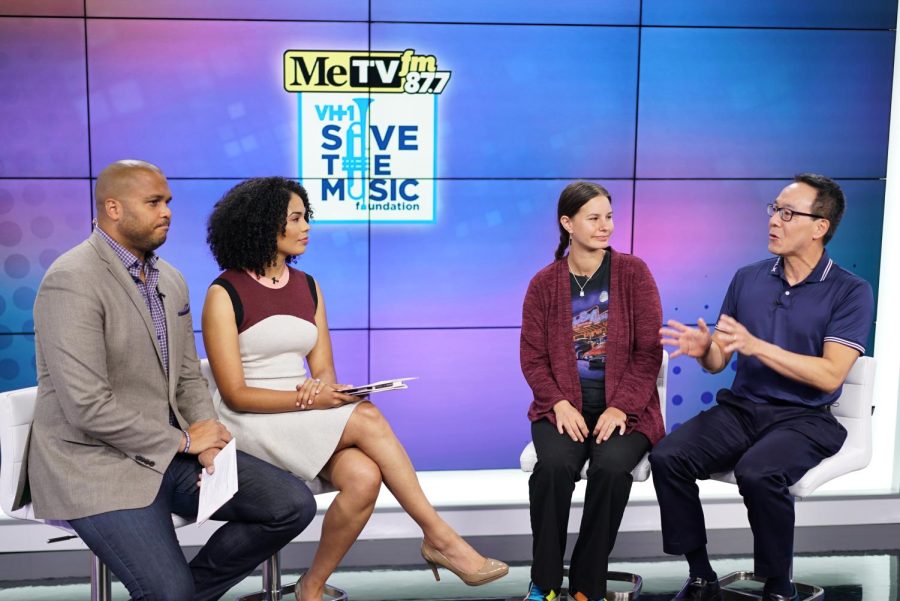Smooth jazz radio pioneer enters Illini Media Hall of Fame
Photo courtesy of Ralph Nozaki
Ralph Nozaki worked for WPGU during his time at the University, and once graduating he began working at WCLR and created a program called “The Sunday Lite Brunch.”
Apr 5, 2022
Ralph Nozaki, known professionally as Rick O’Dell, has had many titles throughout his career at various radio stations in the Chicagoland area.
Soon, the pioneer of the smooth jazz format will have another title under his belt after being inducted into the Illini Media 2022 Hall of Fame.
But Nozaki didn’t enter college with the intention of pursuing a career in radio.
“As the child of Japanese-American parents,” he said, “I was directed toward a more traditional, conventional and secure career path. So, it was maybe medicine, engineering, law, accounting, something like that. My parents and my family never came from a broadcast background.”
He wasn’t sure whether pursuing a career in radio was the right path for him until he attended a WPGU Open House halfway through his freshman year. Shortly after, he joined the DBS station in 1976, which was renamed WDBS in 1977.
Get The Daily Illini in your inbox!
“Anybody who aspired to doing an air shift at WPGU had to get their practice in and polish up their act working at this a.m. station called DBS,” he said, “which was transmitted to the dorms only through the electrical wiring in each of the dorm buildings.”
During his sophomore year, Nozaki became the WDBS supervisor and began working at WPGU, which he continued throughout his time in college.
Judy O’Kelly, former WPGU staffer, met Nozaki during her first year at the University. She said Nozaki was instrumental in helping her learn the ropes at WPGU. The two are still close friends.
“Even though we were students,” she said, “I knew that I was working with someone who really had it together. He was dynamic, and his personality, he was extremely disciplined.”
O’Kelly has always admired Nozaki — even during their time together at WPGU.
“He was someone that inspired me because I could tell that he took it seriously,” O’Kelly said. “He’s a lot of fun, but he took it seriously, and he carved a path for himself from the very beginning. I’m not surprised at all that he’s in the Hall of Fame.”
Nozaki said his time at WPGU prepared him for the professional world in “every possible way.” He advised young students who are interested in broadcasting to gain experience while in college and high school.
“Whether it’s a traditional radio station, a conventional radio station or if it’s an internet/digital operation, do everything,” he said. “Don’t limit yourself to just the job that you see yourself doing in five or 10 years or the rest of your career.”
Nozaki earned a bachelor’s and master’s in speech communication from the University. He went on to work at various stations around the Chicago area, spending the summer of 1981 at WKDC in Elmhurst, Illinois, before moving to WAUR in Aurora, Illinois, in the fall.
In 1984, he moved to WCLR in Chicago and spent five years there.
It was Nozaki’s smooth jazz program — called “The Sunday Lite Brunch” — at WCLR that gained the attention of Chicago media critic, Robert Feder, who became acquainted with Nozaki in 1987.
“That’s when he started ‘The Sunday Lite Brunch,’ which was the forerunner of the entire smooth jazz format that he helped pioneer at WNUA,” Feder said.
After WCLR, Nozaki spent nearly 20 years at WNUA in Chicago, where he continued to grow and evolve the smooth jazz format. He said his career arc followed the progression of the format.
“When I started at WNUA in 1989,” Nozaki said, “it was the start of the smooth jazz format, so I was lucky enough to get in on the ground floor of that format, see it take off and become a ratings leader.”
After leaving WNUA in 2008, he continued the smooth jazz format at WLFM in Chicago for another three years, hosting the “Smooth Jazz Sunday Brunch.” He then took a two-year break to start an internet-based station called Smooth Jazz Chicago.
Nozaki said smooth jazz’s popularity began to decline in 2005. His time working with the format taught him how to be versatile and to enjoy both the high and low points of his career.
“The opportunity to be part of a radio format from its beginning to its end is not something that happens every day,” Nozaki said. “I’m thankful for the chance to have been part of it for as long as I was.”
He currently works at WRME in Chicago, where he’s been since 2015.
Feder said Nozaki is an “ambassador for Chicago radio,” saying Nozaki has the most solid, devoted work ethic of anyone he’s known in radio.
“He had this devotion to radio,” Feder said, “and I think that it became more than a career. It became a calling and a passion for him, and I think that’s a large reason he’s been so successful to this day.”
He commended Nozaki for his versatility in being an “outstanding midday host in Chicago radio,” and a “world-class programmer,” along with his work in popularizing smooth jazz.
“So much of it, I think, was based upon his passion and his commitment and his enthusiasm for the format,” Feder said. “I don’t know if it would have taken hold in the market as well as it did if he hadn’t been there at the outset.”
Above all else, Nozaki said he wouldn’t trade his time at the University for anything.
“My years in Champaign were just a total blast,” he said. “Lots of work and lots of long days and a few all-nighters, but every moment spent down there was worth it.”






